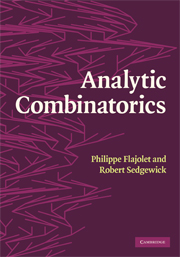AN INVITATION TO ANALYTIC COMBINATORICS
Published online by Cambridge University Press: 11 April 2011
Summary
διὸ δὴ συμμειγνύμενα αὐτά τε πρὸς αὑτὰ ϰαὶ πρὸς ἂλληλα τὴν
ποιϰιλίαν ἐστὶν ἂπειρα ἧς δὴ δεῖ ϑεωροὺς γίγνεσϑαι τοὺς
μέλλοντας περὶ ϕύσεως εἰϰότι λόγῳ
—Plato, The TimaeusAnalytic Combinatorics is primarily a book about combinatorics, that is, the study of finite structures built according to a finite set of rules. Analytic in the title means that we concern ourselves with methods from mathematical analysis, in particular complex and asymptotic analysis. The two fields, combinatorial enumeration and complex analysis, are organized into a coherent set of methods for the first time in this book. Our broad objective is to discover how the continuous may help us to understand the discrete and to quantify its properties.
Combinatorics is, as told by its name, the science of combinations. Given basic rules for assembling simple components, what are the properties of the resulting objects? Here, our goal is to develop methods dedicated to quantitative properties of combinatorial structures. In other words, we want to measure things. Say that we have n different items like cards or balls of different colours. In how many ways can we lay them on a table, all in one row? You certainly recognize this counting problem—finding the number of permutations of n elements.
- Type
- Chapter
- Information
- Analytic Combinatorics , pp. 1 - 12Publisher: Cambridge University PressPrint publication year: 2009
- 2
- Cited by



